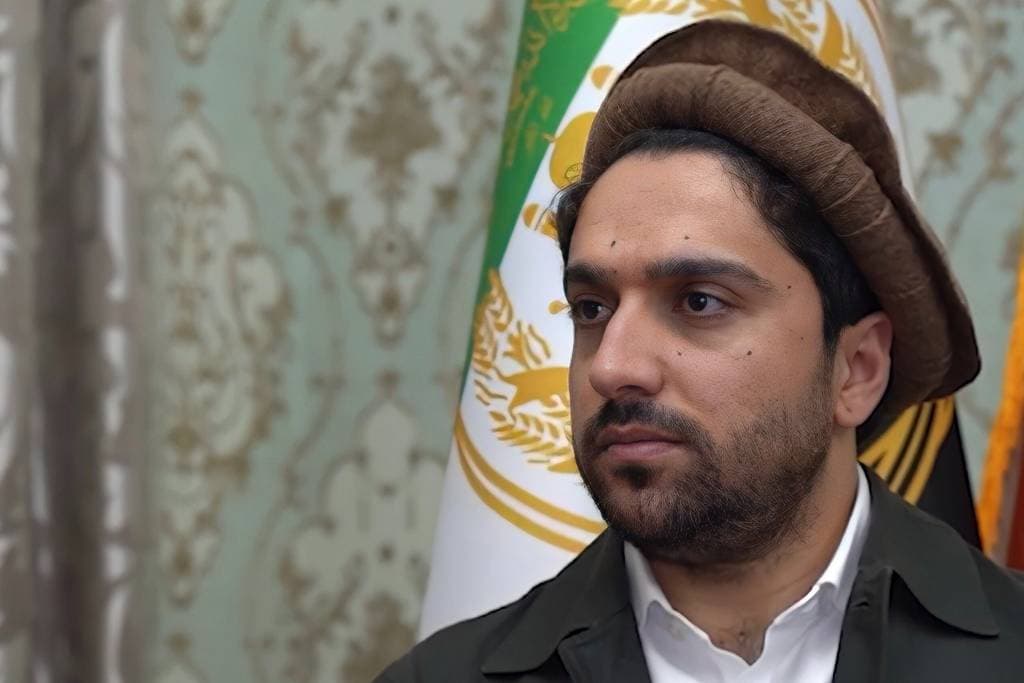A New ‘Lion of Panjshir’ Emerges as the Last Man Standing in America’s Abandoned War on Terror
He dreamed of being an astronomer but destiny called.

“I love three things in this world,” Ahmad Massoud once told French philosopher Bernard-Henri Levy, “books, gardens and astronomy.” Now, the young Afghan finds himself leading a rag-tag band of rebels nestled in the mountains of the Hindu Kush. They are the last remnants of the Global War on Terror launched by America and her allies in the wake of the 9/11 terror attacks.
America has deserted the battlefield and, Mr. Massoud, son of the martyred sheik Ahmad Shah Massoud, known as the Lion of Panjshir, tells the Sun, is now in effect “providing the electricity, the fuel and paying the guard” to operate the “electric chair” at the prison that is Afghanistan since the Taliban seized the country last August. The metaphor is one of a series of blunt assertions from the young commander.
Mr. Massoud uses the analogy, in an extensive interview by telephone from his base in Tajikistan, while referring to the pallets of cash that are arriving at Kabul’s airport every few weeks, as reported by the Sun earlier this month. The funds are estimated to amount to hundreds of millions of dollars. “Without the aid,” says Mr. Massoud, “the Taliban will not survive.”
Ostensibly the money is intended as humanitarian assistance, which Mr. Massoud says that he appreciates in principle. Almost all of it, though, ends up in the hands of the Taliban. He suggests that such disbursements are funneled through a series of non-governmental organizations. “I have evidence,” he asserts, “that the Taliban have set up more than 900 NGOs in the last year alone to divert this aid to themselves.”
A study last year by the Costs of War project at Brown University’s Watson Institute estimates that the War on Terror has cost the United States $8 trillion over the past two decades. Mr. Massoud draws a sharp contrast between that strategy and the predicament of his own resistance organization. Now, says Mr. Massoud, “we are continuing the war on terror all alone with limited resources.”
There is not a single state that supports his National Resistance Front of Afghanistan. The Americans will have no contact with him, he says, dismissing a recent Voice of America report claiming that American officials are meeting with anti-Taliban figures. “One thing the Taliban insist on is that the United States shouldn’t meet with us or engage with us,” Mr. Massoud says. “The U.S. doesn’t want to upset that balance.”
Yet, with minimal support, he claims, much could be achieved. He also draws a contrast with American support for Ukraine in its war against Russia, noting that the differences couldn’t be starker. “If I had half a percent” of what the Ukrainians are receiving from America, says Mr. Massoud laconically, “we will be able to liberate Afghanistan.”
The divergence between the United States and the freedom fighters of Afghanistan is a relatively recent development and a symbol, tragically, of the Biden years. Mr. Massoud and his comrades have long been among America’s closest allies in the region.
The affinity began with American support for the famed Mujahideen fighters during the Soviet invasion of the country in 1979. Mr. Massoud’s father was among the most effective chieftains in that war, and long a vocal supporter of the West. The senior Massoud’s defiance in the face of foreign invaders earned him iconic status in Afghanistan, and his “Lion of Panjshir” moniker.
That moniker is a reference to Massoud’s stronghold in the isolated, rocky Panjshir Valley in the country’s northeast. In the 1990s, as the Taliban first rose to power, Ahmad Shah Massoud led the resistance. His United Islamic Front for the Salvation of Afghanistan, known as the Northern Alliance, retained control of some 5 to 10 percent of the country.
The senior Massoud met with the Americans in 1999 and 2000 and, in a message to President George W. Bush in early 2001, warned America of a terrorist attack by Al Qaeda on American soil. He sounded the alarm again in a speech to the European Parliament that April. But it was the senior Massoud’s death and the events that shortly followed which sealed in blood the alliance during the next two decades.
On September 9, 2001 a pair of journalists seeking an interview with Massoud turned out to be suicide bombers. They set off explosives hidden in a camera and battery-pack, killing the legendary resistance fighter. The attack was later disclosed to have been ordered by Osama Bin Laden himself. The funeral at Massoud’s home village of Bazarak in Panjshir was attended by hundreds of thousands.
At the rites, a 13-year old Ahmad Massoud vowed that he “would seek justice and do whatever” to achieve his father’s vision. Just two days later, following the 9/11 attacks, the adolescent Massoud found that the greatest military power in history was setting its sights on the same enemy who had ordered his father’s death. America, he says, “finally made a decision to declare war on terrorism.”
In entering Afghanistan just months later, the United States quickly teamed up with the senior Massoud’s Northern Alliance, capturing key cities and large swathes of land. “My father sacrificed his life for democracy,” says the junior Massoud, “but our forces with the help of the coalition’s air support were able to accelerate the liberation of the country and destruction of the enemy in 2001.”
There is no resentment in Mr. Massoud’s voice today. He’s deeply disappointed and frustrated though. “We never knew we would be abandoned exactly 20 years later,” he says, adding that America “abandoned this fight” because its assessment of the risk of being attacked again is low. “They are mistaken,” Mr. Massoud warns. “The reason they came to Afghanistan was to defeat terrorism. However, terrorism today is much stronger than it was in 2001.”
“They might have left Afghanistan,” Mr. Massoud says of America, “but Afghanistan will never leave them.” Now, the West’s worst nightmare has been reconstituted in Afghanistan. It’s “become a hub and haven for more than 20 terrorist groups that ultimately want to attack the United States again,” Mr. Massoud warns.
For the people of Afghanistan, it’s hell on earth, and particularly for the women. “Under the Taliban, girls and women are living in a nightmare,” says Mr. Massoud. “Last week,” he asserts, “two women were beheaded in Samangan [province] because they refused to have intercourse with a Taliban fighter. This is how bad the situation is today.”
Days ago, the Taliban drew international condemnation after announcing a ban on women attending university. Having been raised by a single mother, Mr. Massoud is particularly sensitive to the plight of Afghan women. He also has five sisters. “I owe my upbringing to the women in my life,” he says, adding, “The treatment of women in Afghanistan by the Taliban is the same as under ISIS rule.”
Should he ever be granted an audience with President Biden, Mr. Massoud says he’d tell the American leader that “forgetting and ignoring Afghanistan will be detrimental to his own people’s security.” What kind of assistance does he need? “The Taliban fear God, but what they fear even more is drones,” he says. “We will need resources to give us an edge in the battlefield.”
Without such capabilities, a total victory over international terrorism would, Mr. Massoud says bluntly, “not be feasible anytime soon.”
“I never thought I would be fighting a war like my father,” the would-be astronomer who dreamed of working for NASA, tells the Sun, but now he’s committed. “I may die, but it’s for my country, my people and my values. I am determined and committed to this cause for freedom, and I am willing to pay the ultimate price.”
Like his father before him, Mr. Massoud is also sounding the alarm. And as with his father, the United States isn’t listening. “We truly feel that we are not only fighting for our freedom and security but for the security of human beings throughout the world,” he says. “There’s still time to prevent the spread of terrorism,” asserts the new Lion of Panjshir.

